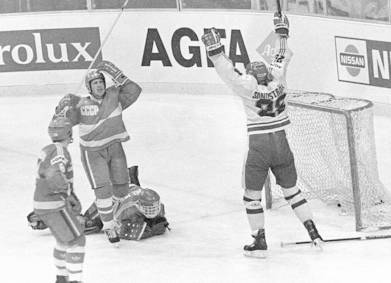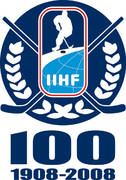Story #44
May 1, 1987 — Vienna, Austria
The 1987 World Championship in Vienna, Austria, was marred by the “Sikora-case”, a jurisdictional quagmire which almost ruined the entire tournament and became a nightmare for the IIHF. An eligibility dispute regarding the West German player Miroslav Sikora became a case for the Vienna District Court which, in an unprecedented event, overruled a decision by the championship directorate. The IIHF had to adjust the standings according to the court’s decision.
Amid all the turmoil and confusion, where accredited journalists spent as much time covering the Vienna court as writing about hockey, the players tried to stay focused on the games. In the end, there were four teams left in the run for gold: the defending champion, Soviet Union, Canada, Czechoslovakia and Sweden, a country that had not won hockey gold since 1962. The teams played a four-team final round-robin playoff for the medals. (It wasn’t until 1992 that there was a one-game, winner-take-all gold medal game.)
What became the key match up was played on May 1 -- Sweden vs. Soviet Union -- in the second round of the round-robin. Both teams had tied their first games as Sweden battled Czechoslovakia to a 3-3 draw and Canada surprisingly held the vaunted Soviets to a scoreless tie.
With less than a minute and a half remaining in the game, the Big Red Machine was leading 2-1 and on its way to another world title. The Soviets had their best unit on ice: defencemen Vyacheslav Fetisov and Alexei Kasatonov and forwards Igor Larionov, Sergei Makarov and Vladimir Krutov. They had young Evgeni Belosheikin in goal. Sweden answered with their best: Tommy Albelin and Anders Eldebrink on defence, while Bengt-Ake Gustafsson centred wingers Hakan Loob and Tomas Sandstrom.
Gustafsson, arguably one of the finest centres in international hockey, got the puck from Eldebrink and skated from his own zone up the middle, making a couple of nice moves along the way. Inside the blue line, he turned and made a drop pass to Albelin who crossed the puck from his right point position to Loob, who was standing to the left of the Soviet goal.
When Loob was checked by Kasatonov, the Swedish forward made an amazing turn-around backhand pass that surprised the entire Soviet defence, including the goaltender Belosheikan. The puck went straight to Sandstrom, who had pinched in deep and was standing to the right of the net. With the Soviet defence collapsed around Loob, Sandstrom could almost effortlessly chip the puck into the empty side of the net. All five Swedish players on the ice had the puck before it went in.
The historic photo shows how Belosheikin threw his stick as a last desperate effort to deflect the puck and possibly make the referee call a penalty shot. Kasatonov, when realising what had happened, threw out his arms in disbelief. The best five-man-unit in the history of the game was utterly outplayed at a crucial moment in a crucial game. Time of the goal: 18:39. Final score: 2-2.
Sandstrom’s marker is one of the best and most spectacular goals ever scored in the history of the championships. And, eventually, it gave Sweden its first gold medal in 25 years. On May 3, on the last day of the final round-robin, Sweden crushed Canada 9-0 in the early game. The score against the demoralised Canadians gave the Swedes superior goal difference over the Soviets. Sweden, with four points, could still have been overtaken by Czechoslovakia had the Czechs defeated the Soviets in the very late game (and final contest of the tournament). But the Soviets won, 2-1, and the Swedish team started their wild celebration in the stands. A quarter of century of Swedish frustration was over.
Despite Tre Kronor’s win, it became all too obvious that the IIHF’s system of awarding medals was badly flawed and outdated. The Soviet team came into the championship as defending World Champions; they were the only team that didn’t lose a single game in Vienna; but, they still didn’t win gold. Sweden won thanks to an inflated score against Canada, in the only game of the final round where one of the teams was no longer in a position to win gold.
But this is not what people recall from the sunny Vienna spring of 1987. Once the Sikora controversy had been dealt with, what is stuck in everyone’s memory was the amazing Tomas Sandstrom goal which eventually led to the historic gold.
As part of the IIHF's 100th anniversary celebrations, www.IIHF.com is featuring the 100 top international hockey stories from the past century (1908-2008). Starting now and continuing through the 2008 IIHF World Championships in Canada, we will bring you approximately three stories a week counting down from Number 100 to Number 11.
The Final Top 10 Countdown will be one of the highlights of the IIHF's Centennial Gala Evening in Quebec City on May 17, the day prior to the Gold Medal Game of the 2008 World Championship.
These are the criteria for inclusion on this list: First, the story has to have had a considerable influence on international hockey. Second, it has to have had either a major immediate impact or a long-lasting significance on the game. Third, although it doesn't necessarily have to be about top players, the story does have to pertain to the highest level of play, notably Olympics, World Championships, and the like. The story can be about a single moment — a goal, a great save, a referee's call — or about an historic event of longer duration — a game, series, tournament, or rule change.
|
 |
Click here for the 100 Top Stories
|










